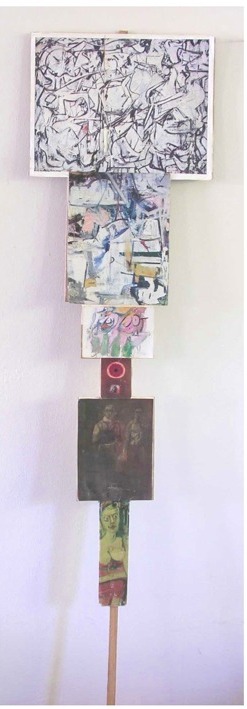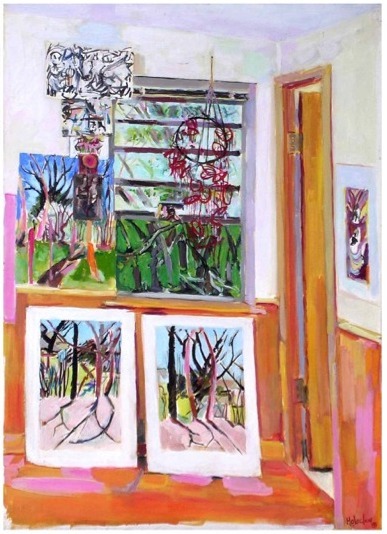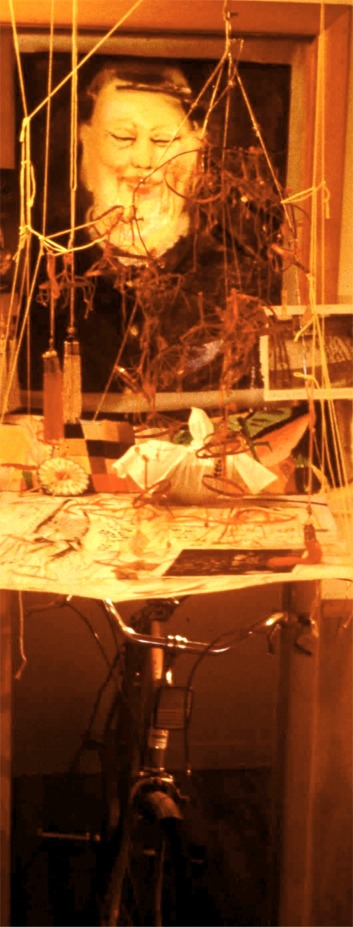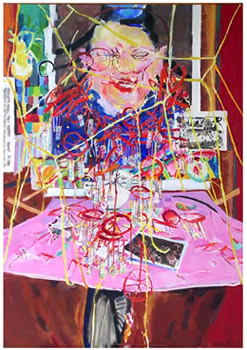|
|
 |
 |
Since
I was "sitting" (zazen) alone and practicing art...I
deliberately began to mix the two. For kinhin (walking meditation),
I made myself a "picket" sign. My picket sign was a
column of painting reproductions from a Metropolitan Museum catalog.
They were mostly of Willem deKooning paintings but there was one
Gottleib stuck in. When you do kinhin, you place your hands with
one hand wrapped around the other, which is in a fist with the
thumb held inside. As you walk slowly in a circle, your elbows
are to be held proudly as if holding a banner. So, I would carry
my "picket" sign silently round and around. I imagined
I was picketing bad art (oppression). I imagined I was proclaiming
sensibility (freedom). (-A developed sensibility is itself happiness.)
I realized that art because it is visual (not verbal), it has
to be positive. Words have a different leverage, they can be against.
(and WHY would anyone show or make 'ugly' or 'stupid' art? I had
often wondered that.)
|
 "Picket Sign"
"Picket Sign" |
 "Art Picket"
oil 20" x 28" 1987
"Art Picket"
oil 20" x 28" 1987 |
In
"Art Picket" (also called 'Large Nativity') we see an
"interior". The three pastel drawings lean or hang against
a wall with one window, half open. The picket sign hangs opposite
the remaining wind chimes. On the adjacent forward angling wall
is an open golden door with a Korean print hanging on that wall,
right of the door. The painting itself leaves off on the left
side and bottom insisting that the picture is in the style of
"picture plane is a window". This 'real' space is finite.
(-I am finite.)
So I wanted to make art again…it had been over a decade-
since 1976-that I'd really worked solidly. I recalled my painting
"Hysterical Space" as a model and thought about it.
It was a meditation. The wind chimes in the painting were important.
I had been drawing wind chimes since 1971. I had hung them all
around my bed. As an infant in Japan, my mother had hung celluloid
toys, like wind chimes above my bed. Adding to the wind chimes,
I got the notion of a ragman or a peddler from China. I wanted
to make a 'Buddha' facsimile. This coincided with the T'einnemen
Square stand off and massacre. The peddler would be "Mao".
"Mao" as symbolic of a "Chinese"...and "Chinese"
as "Chinese" which meant "Buddhist" to me.
I drew a large pastel "Mao", and hung it in the (empty)
closet above my bicycle. On the handlebars, I placed a large pink
drawing of wind chimes. On the drawing is an "oryoki"
(ceremonial eating bowl used in long formal meditation) and this
suggested a bicycle peddler with his handlebar filled with pork
rolls (pao). Then I hung the wind chimes in the valley of space
above and between the viewer and the picture of Mao. The first
"Mao" painting shows Mao with pigtails. In China during
the Cultural Revolution Mao made everyone cut off his or her pigtails.
Here the inevitable has happened, the pigtails grew back. Mao
also has a golden Buddha on a lotus for a rear view mirror. |
 Mao's Still Life
Mao's Still Life |
 "Mao's Pigtails
II" oil 17" x 59" 1988
"Mao's Pigtails
II" oil 17" x 59" 1988 |
 "Mao's Pigtails"
oil 33" x 47" 1988
"Mao's Pigtails"
oil 33" x 47" 1988 |
|